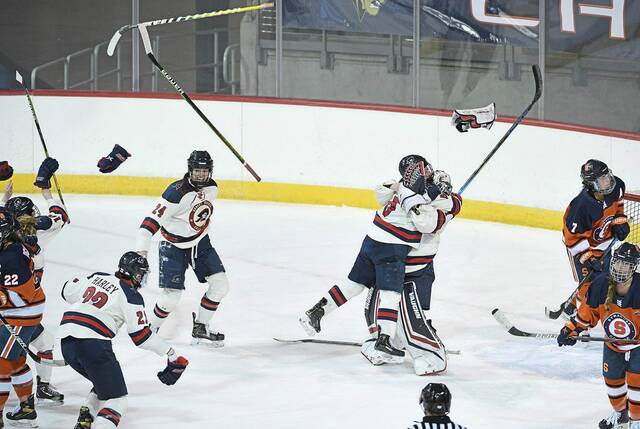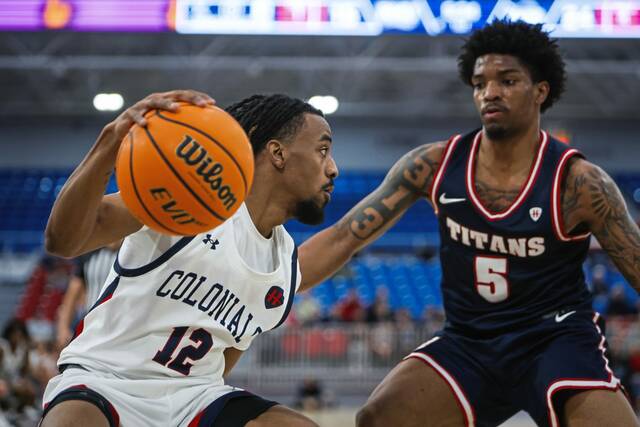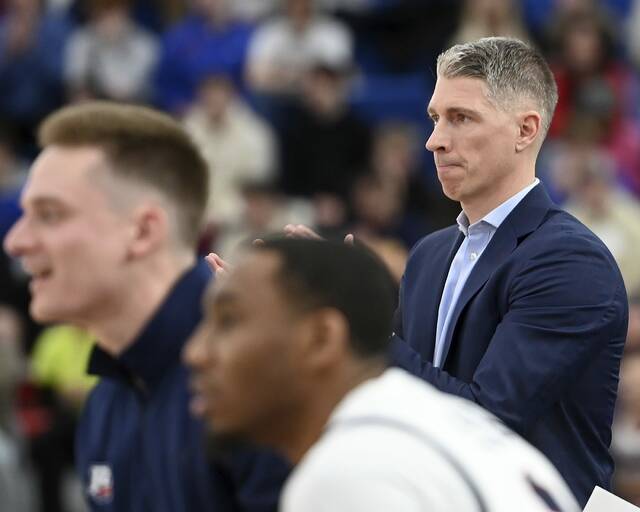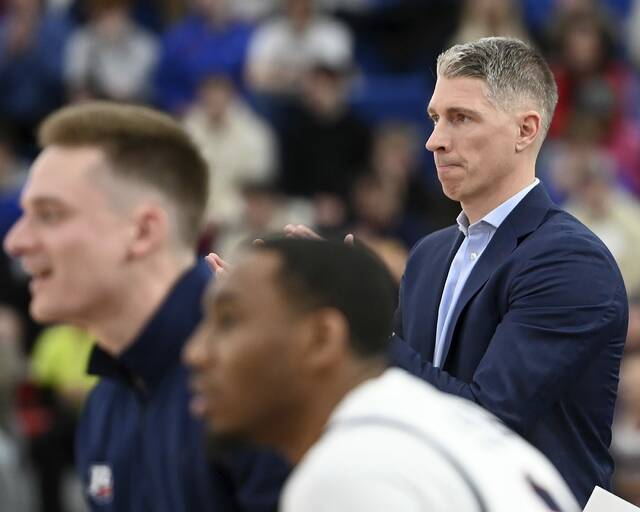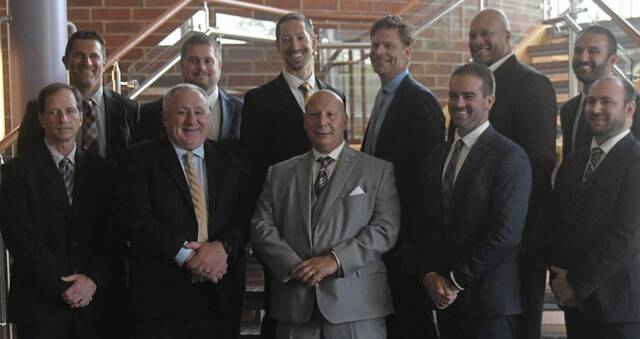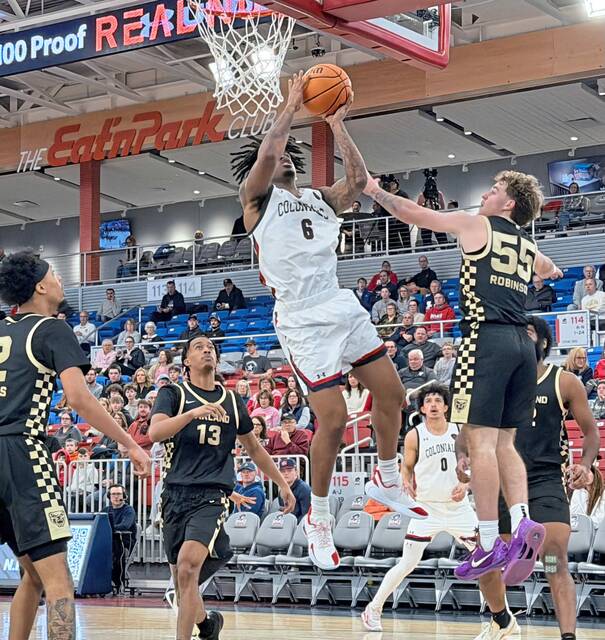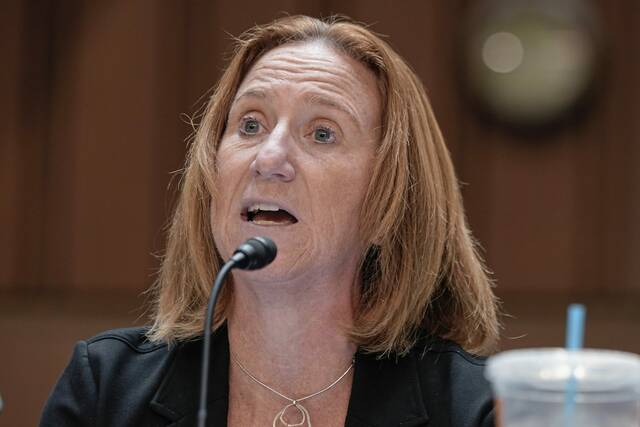“Hockey is the Goal” has been the rallying cry for fundraising efforts to reinstate the Robert Morris men’s and women’s hockey teams.
On Friday afternoon, men’s coach Derek Schooley gave the slogan a new twist.
“Hockey is the goal. And the goal was just scored.”
Seven months after the Colonials men’s and women’s programs were eliminated from the athletic department, the school announced Friday that both teams have been reinstated, effective immediately. They will resume competition in the 2023-24 season.
Robert Morris athletic director Chris King said the reason to wait another year was threefold. Primarily, it’s give Schooley a chance to rebuild a roster on the men’s side. And with women’s coach Paul Colontino leaving to become a coach and vice president of hockey administration at Bishop Kearney Selects in Rochester, an entire staff needs to be rebuilt on the women’s side before a roster can be shaped.
Second, according to King, the sense he is getting is that conference commissioners (Atlantic Hockey for the men, College Hockey America for the women) and the athletic directors within want the Robert Morris teams to be built up so they can be competitive once they return to conference play.
“They’d prefer for us to come back in ’23-’24 for those same reasons,” King explained. “To make sure we are at the funding level that the rest of the conference is at. That we are at the same competitive success level we were at. Because that elevates the conference as well as the RPI.”
The two Colonials programs were eliminated just weeks after the women’s team won its conference tournament and the men’s team claimed a regular-season division championship.
The third point is the funding element that King referenced.
In the wake of the cuts, a group of alumni and supporters formed the Pittsburgh College Hockey Foundation. It was an outside fundraising arm to help bring the teams back. King says the PCHF and the university raised close to a projected goal of $2.8 million to be used in Year 1 of reinstatement and then spread over successive years.
But the school believed the long-term viability of the program would be best served through another year of fundraising without operational expenditures next year.
In the wake of the announcement, some on social media were dubious that the school would follow through on promises to get back on the ice with another yearlong lag and with a six-month track record of apparently moving the goalposts when it came to financial marks to hit.
King tried to quell those concerns.
“We’ve reinstated effective immediately. … We have to sustain and elevate that support,” King said. “We have them back. And it will be much easier (to fundraise) once we get them back on the ice.”
The announcement of a yearlong ramp-up was also met with mixed emotions by some, particularly the remaining 13 players between the two teams who didn’t find another place to play or decided to stick it out with Robert Morris.
“Split decision,” said defenseman Geoff Lawson, a senior who stayed with the Colonials program through the cuts.
“To have the school have hockey teams, that’s what our goal was,” Lawson said. “But (there is) a lot of thinking going on. Because I don’t know if I really want to wait until I’m 27, playing college hockey. But we’ll see. Lots of decisions to be made. … For anyone who is a senior right now, waiting another two years to play a hockey season is tough. It’s still good for the school, though.”
Backlash over the initial decision to cut the teams in May was quick from the student body and players, throughout the college hockey world and on social media.
The university also faced pressure from two lawyers who warned of legal action, insinuating that university president Christopher Howard and some members of the board defrauded current student-athletes and misled potential recruits by surreptitiously planning to eliminate the programs well in advance of letting players know of their eventual decision.
During Friday’s news conference, Howard was asked if he felt like, in retrospect, it was the wrong decision to cut the teams.
“No,” Howard replied. “We made the best decision we could with the information we had. Financial. Strategic. Operational reasons. We needed a rally and the community to step forward.”
Well, those on the outside — alumni, donors, engaged students and fans — did step forward to initiate university cooperation to reinstate the teams. And, as Schooley referenced, the biggest goal in Colonials history has just been scored.
Now there’s just a two-year intermission before the teams can get back on the ice.


